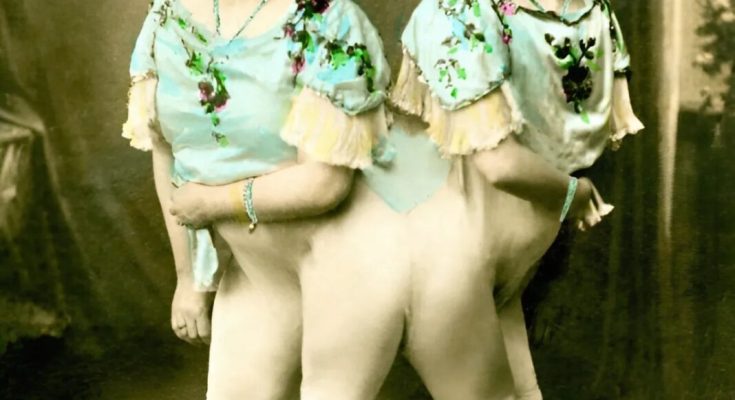Róza and Josefa Blazek were Siamese twin sisters born joined at the pelvis. When they were 26, one of them met a man and fell in love. 😲
Three years later, Róza became pregnant and gave birth to a very unusual child 😱. Both sisters produced milk and breastfed the baby together.
Photos of the beloved man and the son of these extraordinary sisters were shown in the first comment 👇👇
Róza and Josefa Blazek were born on January 20, 1878, in Bohemia, a region that’s now part of the Czech Republic. From the very moment they opened their eyes to the world, life had already written a story unlike any other. They were Siamese twins, joined at the pelvis—a union that would shape their lives in ways both extraordinary and heartbreaking. Their bond was physical, yes, but it became a symbol of resilience, love, and sacrifice. They were bound together for life, sharing body and spirit, and yet, somehow, they found a way to carve out their own path amidst it all.
Growing up, Rosa and Josefa discovered their love of music. Despite the challenges of their condition, they studied instruments, sang in harmony, and eventually took to the stage. Their performances across Europe became renowned, not just because of their incredible bond but because of the beauty they created through music. Their act, called “Two Souls, One Heart,” touched audiences deeply, stirring tears and admiration wherever they went. Their lives were a testament to the enduring strength of sisterhood and the power of art to transcend physical limitations.
In 1906, during a tour in France, everything changed for Róza. She met a young officer named Franz, and her world subtly shifted. What began as a chance encounter blossomed into a gentle romance—one that broke the unspoken boundaries her sister Josefa felt painfully, yet she couldn’t bear to stand in the way of her sister’s happiness. Josefa struggled with difficult feelings; she felt left out, isolated by the love that blossomed between Róza and Franz. Yet, despite her initial pain, she slowly came to accept the fact that her sister deserved love and happiness—something that she could not, and should not, deny her.
Their relationship deepened as Róza and Franz’s bond grew stronger. Regular meetings and shared moments became a sacred routine, even as Josefa endured her sadness. The years passed, and life’s strange twists continued to surprise them. Then, in 1909, France was rocked by a remarkable fact: one of the Siamese twins was pregnant. The world assumed it was Róza—the one who was in love and in a relationship. And it was true. But because their bodies were joined, Josefa was forced to endure everything too. She experienced the morning sickness, the anxious anticipation, the labor pains. Her own body shared in the suffering and the miracle.
On April 16, 1910, a beautiful miracle was born—an infant boy named Franz, after his father. The sisters’ bond extended into motherhood. They nurtured and cared for their child together, sharing milk and tending to his needs as if they were one entity. Their love and dedication proved that their connection was unbreakable, a true testament to their extraordinary life. As they returned to the stage with their infant son, their act was renamed “Two Mothers—One Heart,” and it moved audiences to tears. People saw in them the purest form of devotion—motherhood, sisterhood, and love intertwined inseparably.
Yet life continued to test them. In 1922, Josefa’s health declined. She fell gravely ill, and doctors suggested a risky surgical separation—an operation that might have saved Róza but would have ultimately ended Josefa’s life. Róza refused immediately. “We came into this world together—and we will leave it together,” she declared firmly, her voice filled with unwavering conviction. Her love for her sister was infinite, and her choice was a testament to the unbreakable bond between them.
And so, they remained conjoined, facing life’s trials and joys together, until the very end. On a quiet day, exactly 12 minutes apart, Róza and Josefa left this world—together, as they had been in life. Their story is one of rare love, sacrifice, and resilience—a reminder that even in the face of impossible circumstances, the human spirit can find extraordinary strength. Their lives continue to inspire, whispering stories of a bond so deep that nothing could tear it apart.







